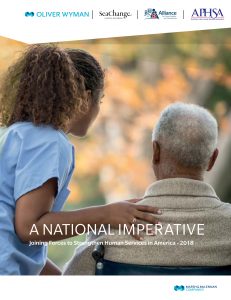Framing the Challenges Facing the Human Service Sector
January 25, 2018Human services play an essential role in building and maintaining the health and well-being that we all need in order live up to our potential and contribute to our communities in meaningful ways. Yet a report released this week by the Alliance for Strong Families and Communities (Alliance) and the American Public Human Services Association (APHSA) identifies important structural challenges that are limiting the sector’s ability to address society’s most important priorities.
 National Imperative: Joining Forces to Strengthen Human Services in America was the result of a rigorous examination of the health of community-based human service organizations conducted by Oliver Wyman and SeaChange Capital Partners. The report analyzes the underlying causes of stressors impacting the sector, such as contracts that don’t accurately reflect the costs of quality services, and offers recommendations for how community-based organizations, policymakers, the public sector, and other stakeholders can collectively address the challenges confronting human services.
National Imperative: Joining Forces to Strengthen Human Services in America was the result of a rigorous examination of the health of community-based human service organizations conducted by Oliver Wyman and SeaChange Capital Partners. The report analyzes the underlying causes of stressors impacting the sector, such as contracts that don’t accurately reflect the costs of quality services, and offers recommendations for how community-based organizations, policymakers, the public sector, and other stakeholders can collectively address the challenges confronting human services.The Alliance and APHSA have been very thoughtful in their framing of the report, relying on the Building Well-Being Narrative to articulate what is at stake and taking a pragmatic, solutions-oriented approach to explaining what it will take to strengthen the sector. As organizations share the report with the press, policymakers, and other stakeholders, we offer a few tips to help you follow the Alliance and APHSA’s good example:
- Begin every message about the report by reminding the public of the important role that human services play in helping people reach their potential and fully contribute to their communities.
- Rely on the Construction Metaphor to explain what human services do and how they function. The report notes that misperceptions about human services are a road block for improving the health of the sector. The construction metaphor offers a proven strategy for providing the public with a more accurate understanding of the sector.
- Avoid framing the findings of the report as an acute crisis or dire emergency. As we’ve talked about in previous issues, crisis-oriented framing can overwhelm the audience and make the problems seem too big to solve.
The Alliance and APHSA developed tools and resources to help human services communicate the report’s findings in a way that reaffirms the valuable role the sector plays in our nation, while drawing attention to the concrete steps that we can take to improve how human services are able to function. Please check out these great resources and help make the case for strengthening community-based human services.
|

